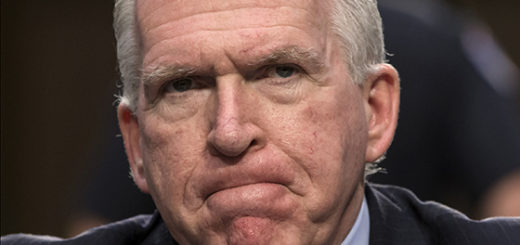Fed regulation of the Internet? Remember the Bell System?
Listen To You Tell Me Texas Friday 2/20/15
Download
The comic strip “Boombox” recently depicted this conversation.
Said the first character,
“Why are liberals so hot for gun control laws. Don’t they know that criminals don’t obey laws?”
The other one answered,
“Because it has the word ‘control’ in it.”
That instinct is indeed the hallmark of most liberal proposals and it extends now to the Internet. On February 26, the Federal Communications Commission is set to announce new regulations with respect to how you connect to the Web.
As is always the case, the proposed rules are cloaked in a benign-sounding label – in this case, “Net Neutrality.” The label is meant to fool you into thinking that the federal government will ensure that everyone has “equal” access to the Internet at “fair” prices. (They called it the Affordable Care Act don’t forget.)
For a glimpse of the regulated Internet future, consider the history of cable TV. It has been a mish-mosh dating back to the 1960s. In addition to FCC regulation, Congress often muddied the water. As just one example there’s the Cable Television Consumer Protection and Competition Act of 1992, which essentially undid the Cable Communications Policy Act of 1984.
Today neither cable operators nor consumers are happy. Cable operators’ costs continue to climb, driven in large measure by the costs of federal regulation, and thus cable subscribers keep seeing their bills go up.
Between rate increases, the resulting consumer churn and protracted fights with local TV stations and national cable networks, the cable TV industry has been in more or less constant uproar for 20 years.
Meanwhile, the Internet has been pretty much free of federal regulation. Yes, there is much going on in Washington regarding the allocation of radio spectrum to accommodate the burgeoning demand for wireless access. Such is properly within the purview of Federal Communications Commission.
But that regulatory process has nothing to do with what you currently pay for Internet service. And if you’re like me, your Internet service is several thousand times faster than that dial-up modem you had in the 1990s and yet costs you less.
Access to the Internet has happened pretty much without the “help” of the federal government and I, for one, am not complaining. I keep finding that connection speeds are going up while costs are going down.
That this happened in a competitive free market beyond the control of federal bureaucrats is something the liberals now running our government cannot stand. Liberals love control and yet the biggest thing to happen in a century has happened without them. So the federal government now proposes to ride to the “rescue.”
Your Internet service is about to be regulated in the same way that your telephone service used to be. Give the old Bell System credit, it was steady and reliable. But if you’re old enough, you remember that “long distance” calls were expensive. Today, the term “long distance” is an anachronism.
The Internet isn’t broken. For Lord’s sake, let’s don’t let the federal government “fix it.”









As you point out, the internet is working fine without government regulation–each year better prices and faster speeds. Government involvement will reverse those trends, and add new taxes to “fund” all the new benefits we will be told we’ll get with regulation. More regulation means more control of our lives and that has always been the ultimate goal of government. Any elected official who votes to regulate the internet needs to understand that he will be regulated out of office come the next election.
I am NOT an anarchist by any means but NO wonder our Nation is sinking into anarchy. We the people, are really getting FED UP with our federal government taking every dime we have got, from out of our pockets!! I am sick of government telling us that it knows what is best for me and mine, then turning around and demanding I pay for it!!! AND THAT’S MY VENT!
I do like (and appreciate) this commentary, along with the many others. I do wish something good would take place so we could hear an uplifting commentary.
They want control of the internet because this is the last resirt of finding out the truth of what is really going on in our government today. The televison and to a certain extent the radio has been bent to conform to what the government wants us to hear. The last of the radio freedom of speech has been hounded to death by liberals and those in Washington who want all free speech GONE! They do not want us to know the TRUTH. So they want to REGULATE it to death in order to destroy what last vestige of truth we have!!!
I agree esp. w/ Linda.
Unbeknownst to many Obama has already taken over the “emergency radio” so that when the emergency is declared no phone works nor radio nor internet because” it clears the airways for emergency workers”.
Now this “emergency can be anything they declare it to be.
I was at Ft. Hood when they implemented this situation & all this DID happen.
It was VERY shocking to find that NOTHING worked until the “emergency” is over.
No one can tell when the ’emergency” is over nor when YOU can call out even if your house is on FIRE!!!
Also try to listen to the radio after 6-7 PM. All static for “freedom” from the big’ stations.
Soon we all will be automons to the Gov’t.!!!
Net Neutrality is just another evil ploy of the Marxist worshiping Obama Autocracy to ultimately eliminate their enemies (on the internet) by restricting freedom of (Conservative) speech while at the same time FORCING the indoctrination of their Marxist dogma onto every internet user in the name of (their definition) of fairness. This is all about controlling “content”, not internet speeds or cost.
Once you understand the wicked intent of the Left is to “rule by force”, all else becomes clear. Counterfeit ideas such as this depend on selling Evil as Good and creating a set of LIES to justify their nationalization and regulation of what is now a consumer driven (free market) medium of communication. Make no mistake, this is just another of example of the eradication of competing ideas that threaten the goal of their Marxist police state that Obama and his followers intend to accomplish in the next two years.
Leftist control of Banking was first, Healthcare was next, Internet is next, Guns and Ammo are coming, and finally Representative government is last when our Federal vote is contaminated by hoards of illegal aliens that vote in favor of Marxist Rule. The “national transformation” promised by Obama-the-Great will be complete. Say Goodbye! to Religious freedom, Speech, Prosperity, Self Defense, and the free market. Everything imaginable will be REGULATED to death as we become servants of the State in order to be in good standing with the Washington elites that rule over us.
If you “like your freedom you can keep it.” By the way, your FREEDOM (to obey) is to be defined in the REGULATIONS, all 100 thousand pages as issued by our wise and dear friends in Washington that don’t work for you anymore.
Where is the Republican opposition in Congress to the unrelenting effort to plunge this country into a Bureaucratic dictatorship by Obama and the Democrat Party? I think I know what the problem is and I offer the following theory.
The Republicans suffer from PTSD due to the non-stop bullying they have suffered at the hands of the Democrats for the last 25 years. This is a tragedy that must STOP so that the Republicans can regain some sense of self-respect. I call upon the Democrats to REPENT of the damage that they have done to our sensitive and well-meaning Republicans that only want to “get along.”
You Democrats should be ashamed of the psychological torture you have heaped upon these innocent Republicans that have been traumatized by your bullying. Please have a little mercy and start treating our precious Republicans with dignity. They mean you no harm. Please let them have at least a few victories so they can hold their head high, once again. Please, please, try to be nice to our Republicans. I beg of you!
Any time a government agency or Congress invoke rules or pass legislation such as Obamacare (2,700 pages) or the FCC Net Neutrality regulations (332 pages) in SECRET with no public review, you can be sure that they desire tyranny over representative government.
“Men loved darkness rather than light because there deeds were evil.” If these would-be dictators (in waiting) were so proud of their product, then why not let the citizenry have a chance to review, comment, revise, or reject it through our representative form of government?
The conclusion is that they hate the Constitution and its moral foundation of liberties and the requirement that government is to be subservient to the people. We are now being ruled by people with evil intent and they are getting away with it. Does Obama love America? Yes, he loves his dictatorial sympathizers, in and out of government.